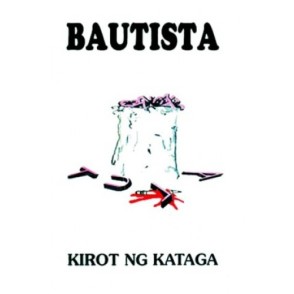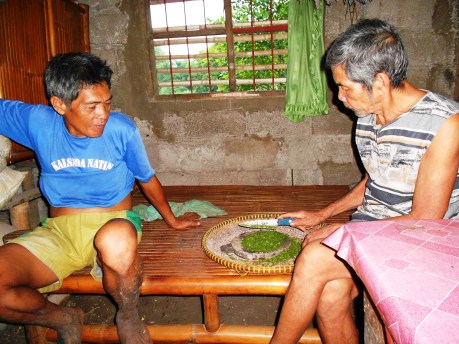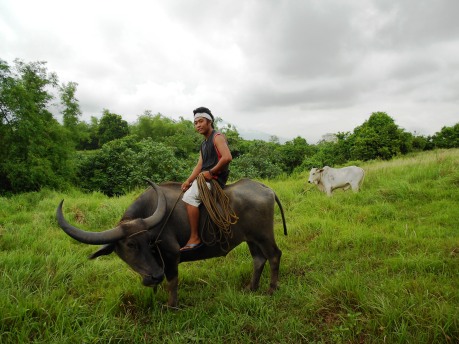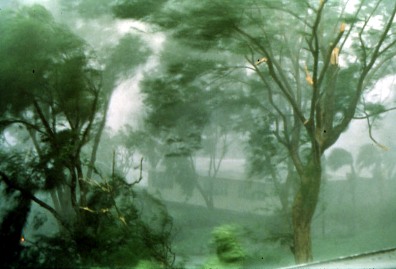DECEMBER MOOD AND SOME TAGALOG POEMS
December 17, 2013
I noticed that Christmas is becoming less and less interesting. I sort of no longer look forward to it unlike when I was younger. Perhaps it is true that Christmas is only for children. I remember that when I was a kid, I would be very happy if I would get presents for Christmas. I did not care if the gifts were cheap, so long as I got them because it was Christmas.
My writer-friend Santiago Villafania said that there is such as thing as “December Mood.” It’s kinda ironic really. The feeling of emptiness and loneliness while everybody around seems to be happy or at least trying to be happy. Christmas songs being carried by the cold winds would instead chill the soul instead of thrill it. When I was in grade school, my classmate Estelito Abonalla told me about this Christmas phenomenon experienced by kids–waking up at dawn to the sound of Christmas song coming from a passing vehicle, say, a tricycle. I could relate because I experienced it too. My heart would leap in excitement for the coming new day. A day that would eventually lead to Christmas day.
Anyway, one memorable Christmas season for me was in the year 2000. I was then staying in Imus, Cavite and writing for The Daily Tribune. I was also trying to finish ROTC. I was “BS RO” so to speak. I would go to the Tribune office to get my money. They were so generous. I would even get my bonus! I was then reading “For Whom the Bell Tolls” by Hemingway. The coldness of the war scenario in the novel would creep up on me. I was after-all just like the characters in the story. I was alone in that flat, and the place felt like a bunker.
Last night, I reread “Kirot ng Kataga,” a book of poems in Tagalog by Cirilo Bautista. You see, I bought the book in December 2000. It’s just a short book, more of a chapbook really. But man, it’s a classic! And the book calls to mind as I rewrite my poems in Tagalog. Let me post some excerpts here of my new poems. This one is from “City of Springs.”
Mga isda, ianod
n’yo ng huklubang ilog
ang huli kong pagdulog:
Ay! Aking sinusumpa,
kung lahat nang makata
ay bayad pag tumula—
Hindi s’ya matataga!
Hindi s’ya matataga!
I also wrote something about the death penalty. Of course, right now we have no capital punishment but just the same, I wrote about it. You see, it would really depend upon Congress if it would revive the same. The 1987 Constitution gives them such allowance. Here’s the last stanzas of “Bisperas (Awit ng Lalaki sa Bitayan)”:
Subalit ay sino itong paparating?
Huling pag-idlip ko ay gagambalain.
Nagmamadali pa’t nakabarong man din—
bagong abogadong sadyang matulungin!
Remedyo raw sana sa aking problema’y
automatic review ng Korte Suprema.
Ang aming kapatas na kasabwat pala,
lahat nang salarin ay kanyang kinanta.
Ang utak ng krimen ay ang aming meyor
na kulang ang pondo para sa eleks’yon.
Kunwari pa’y banal at suki sa Pasyon,
‘yun pala, tit’yempo saka mandarambong.
At dagling umalis itong si attorney.
Tatawagan n’ya raw pati Presidente.
Dapat daw ang husga ng aking ponente’y
swak sa absuwelto at hindi garote!
Ngayong hinahanda ng aking berdugo
ang kanyang ineks’yon at lasong likido.
Sa may isang sulok ay may telepono:
akala mo’y diyos na nakadek’watro.
I also worked on a poem about the poetic process itself. It even delves into the writer’s life and plight. Here’s the beginning stanzas of the poem “Pasada,” also included in my upcoming book:
Sinasabing kadalasan ay malalim na gabi
at ilang ang ruta ng makata.
Mga daliring tumitipa ay susi
sa makina ng makinilya at netbook
at makinaryang umaangil
ang daigdig sa loob ng bungo’t dibdib.
There you go folks. You can expect that I will labor some more for the next poems. I am actually working on a very long poem on my experience as an organizer of poetry gigs here in my locality. Things I do. I don’t expect to be rich by doing said things, but still, I do it. But does it mean that I will no longer do other things that could make me filthy rich? Legal and moral things? Nope. Not at all.
Until next time.
MANILA BOY
November 28, 2012
Been doing patintero with Manila traffic. Kevin de Quiroz in tow, we visited Ms. Dinah Ventura (The Daily Tribune), Ms. Shirley Lua (Bienvenido Santos Creative Writing Center), Manila Times, UST and FEU.
I finally have copies of the August 1 issue of The Daily Tribune where my VerSosimo article appears. I also have copies of the Sunday Times Magazine issues where my poems appeared. Said magazine is not able to reach my locality every Sunday. I was also able to hand over to Ms. Lua the nomination letter (National Artist) for Cirilo F. Bautista by young Bikol writers, all members of Ateneo Literary Asosciation (ALA, Ateneo de Naga University). And of course, the expedition is not purely pleasure but also business. Also looked for a dormitory.
Tomorrow will be the much awaited Ani 37 launch where we will play the National Anthem and other poetry music. Incidentally, we will also play the WG anthem song entitled “Hindi Kami Papayag na Walang Makata sa Lipunan.” The lyrics goes like this:
Hindi kami papayag na walang makata sa lipunan (2x)
Hinding-hinding-hinding-hinding hindi
Di kami makakapayag.
Wala na namang tula sa Inquirer magazine (2x)
Wala-wala-wala-wala-wala
Walang tula sa’ting balita.
(Guitar Solo, repeat stanza then guitar solo till end).
NAME-CALLING AS POWER-RELATIONS
November 20, 2012
Been thinking about name-calling as an element of power relations specially in the case of the Tsinoy. In the area of politics, opposing parties resort to name-calling to cut the opponent down to size instead of engaging him in a level-headed and head-on debate. And in the Philippine setting, it could even lead to disastrous consequences. One party might just decide to bring the animosity to a more physical level and resort to arms.
In political and literary theory, name-calling is seen as an articulation of power-relations. As early as the Spanish era, it was postulated that name-calling or “bansag” was a way for the subjugated to get even with the colonizers. There was even a “patood” that goes this way: “Duwang kastila/Nagboborobintana.”
The answer to that is of course mucus in a runny nose. It could be a way for the Bikolnon peasant folk to “hit back” at their Castillan hacienderos who would merely look at them from their windows while the former toiled in the farms. Name-calling is then a product of class struggle and an adversarial culture. In the realm of psychology, it could be a sign of immaturity on the part of the name-caller.
Being so, name-calling is a “no-no” in the academic setting. Aside from the aforementioned implications, it is tantamount to bullying and psychological violence. It results to animosities. It is also a hindrance to learning hence should never be resorted to by the students, and more importantly, by the teachers.
Our penal code has a provision on libel and slander, the former particularizing on written or published while the latter on oral defamation. Article 353 defines libel in general:
“Art. 353. Definition of libel. — A libel is public and malicious imputation of a crime, or of a vice or defect, real or imaginary, or any act, omission, condition, status, or circumstance tending to cause the dishonor, discredit, or contempt of a natural or juridical person, or to blacken the memory of one who is dead.“
Articles 358 and 359 provide for slander:
“Art. 358. Slander. — Oral defamation shall be punished by arresto mayor in its maximum period to prision correccional in its minimum period if it is of a serious and insulting nature; otherwise the penalty shall be arresto menor or a fine not exceeding 200 pesos.
Art. 359. Slander by deed. — The penalty of arresto mayor in its maximum period to prision correccional in its minimum period or a fine ranging from 200 to 1,000 pesos shall be imposed upon any person who shall perform any act not included and punished in this title, which shall cast dishonor, discredit or contempt upon another person. If said act is not of a serious nature, the penalty shall be arresto menor or a fine not exceeding 200 pesos.”
Likewise, the Civil Code has a provision on the matter:
“Art. 26. Every person shall respect the dignity, personality, privacy and peace of mind of his neighbors and other persons. The following and similar acts, though they may not constitute a criminal offense, shall produce a cause of action for damages, prevention and other relief:
(1) Prying into the privacy of another’s residence:
(2) Meddling with or disturbing the private life or family relations of another;
(3) Intriguing to cause another to be alienated from his friends;
(4) Vexing or humiliating another on account of his religious beliefs, lowly station in life, place of birth, physical defect, or other personal condition.”
And under Article 33 of the Civil Code cases of defamation can be subject of an independent civil action (from the criminal case):
“Art. 33. In cases of defamation, fraud, and physical injuries a civil action for damages, entirely separate and distinct from the criminal action, may be brought by the injured party. Such civil action shall proceed independently of the criminal prosecution, and shall require only a preponderance of evidence.”
Name-calling could fall under the purview of the above provisions and could be subject of a criminal and civil case. And under Art. 26 of the Civil Code, it falls within the purview of the fourth provision on vexing or humiliating on account of other personal condition, and could be a ground for damages, particularly moral damages and exemplary damages. Surely, name-calling could result to “mental anguish.” And said civil action could be proceeded with independent of the criminal case.
So how does name-calling affect Tsinoys? For instance, the teacher keeps on twisting the Chinese-sounding name of the student to make it sound ridiculous. It could humiliate the student for in our culture, one’s family name must be defended by all means being something we inherited from our forefathers. It could also have repercussions on racism. And as we said name-calling is merely a manifestation of power-relations which can be traced back to history.
THE PROBLEM WITH RA 10175
September 26, 2012
Too much law books made me forget about the news. It was only last night when I learned that RA 10175 or the CyberCrime Prevention Act of 2012 has been passed into law. I have been hearing about it and thought that it was only a bill. But mistaken I was, for it is now a law. And dura lex sed lex.
But Article 7 of the Civil Code provides that a law must conform to the Constitution else it could be nullified.
So many writers are questioning the validity of this law. I for one blogged earlier that the measure ought to be unconstitutional because there is a fundamental prohibition to any law that would violate freedom of speech and expression. True enough, there are now petitions calling for its unconstitutionality. From what I have read in one petition, RA 10175 makes the convict liable for libel both as a cybercrime and as a felony (as punished by the Revised Penal Code). There is definitely something wrong with that given our rule regarding double jeopardy. This is aside from the fact that the 1987 Constitution as explicated in the case of Chavez v. Gonzales provides for a two-fold rule when it comes to Freedom of Speech and Expression. Namely, there must be: 1.) Freedom from prior restraint, and 2.) Freedom from subsequent punishment.
And I learned that Sen. Guingona was the lone dissenter, invoking the above doctrine.
In my limited knowledge of the law, I know that with the RPC provision on libel notwithstanding, there is always an allowance for the so-called “Doctrine of Fair Comment.” Well-placed and well-constructed criticism is always welcome in a democratic society. The law on libel is there, perhaps just to discourage people from bringing the law into their own hands by verbally maligning those who have wronged them. It then prods people to use the machinery of the legal system to attain justice.
The more important issue now is what constitutes “prior restraint”? In the Chavez case, it was the Justice Secretary and the NTC’s warnings to the media that continued airing of the scandalous “Hello Garci” tape shall be a violation of the Anti-Wiretapping Act, hence a ground for closure and arrest. Would a duly enacted law on cybercrime or electronic libel constitute “prior restraint”?
But in the Chavez case the Supreme Court ruled that not every violation of the law will justify straitjacketing the exercise of freedom of speech and of the press. The government must prove “clear and present danger”. And there was no showing that the feared violation of the anti-wiretapping law clearly endangers the national security of the State. Hence the DOJ and NTC warnings constituted “prior restraint” as they were delivered as part of official government function. The act does not have to be converted to a formal order or official circular to be considered a breach of press freedom.
Is a possible commission of electronic libel enough to restrain bloggers and social networkers from printing strongly-worded statements on issues they care about? Is there “clear and present danger” that the government would collapse because of it? In the case of Chavez, it was a mere order and yet it was shot down. In the case of RA 10175, it is not just an order, but a law, for that matter. Definitely, it comes under the purview of official government function and inherent State power which is law-making or police power. And Article Three of the Constitution or the Bill of Rights is addressed to the State and its agents. It is a provision that would safeguard the people from possible government overstep on private rights.
NIGHT RELIEF
September 9, 2012
Trying to avoid pancreatitis. That is why I am still up, although I usually wake up early to work. A few hours ago, I was eating street foods with gusto, and I was with the Muse. She cautioned me not to sleep ora mismo, so here I am gate crashing in her apartment. So this is my ‘night relief,’ my throat feeling sore all over.
Yes to Nueva Camarines! That was the battle cry at the Plaza Quezon a few hours ago. I saw Congressman Luis Villafuerte there. They are holding the dance contest, and I was wondering if those young participants really know what they were dancing for. I really hope they do. Soon there will be the plebiscite. Enough has been said about the pros and cons of a new Camarines. At the end of the day, the people will have to decide.
The thing is, Cong. Luis could very well be looking at Naga City right now, Sauron style. The long-time obstacle to his way, former Mayor Jesse Robredo is gone. But again, it’s up to the people of Naga if they will let the Villafuerte’s penetrate the City Hall.
ANI 37 UPDATE
August 31, 2012
Just updated my bio at the “About Me” section of this blog. I made a departure from the essay to the bullet type presentation. It is much easier to edit and update.
There’s a lull in my academic life since the university is having its annual intramurals. And I don’t think they allow the college of law to join the chess competition.
I wonder what will happen to the politicians of Naga City. A friend of mine said it will be “kanya-kanyang sagwan,” everyman for himself in this stormy political weather. Some say that the Villafuertes will finally penetrate the city hall. Not to say that Robredo was not a Villafuerte. After-all he was a nephew of Rep. Luis Villafuerte, only that Sec. Jess practiced a brand of leadership much needed by my troubled republic. Not your usual bureaucratic style of governance, his was a cost-effective, responsive, reformative, servant-leader type of governance.
In the literary sphere, I got an e-mail from Betty Regala, managing editor of CCP‘s literary journal, Ani. I have not been sending works for the years 2009-11. At least now, I am back. Thanks to editor Herminio Beltran. I miss the CCP. I would like to check the exhibits there. I wish to attend the launch this November. If it’s possible, I will bring my band so we could perform.
As for the WG next month, it going to be part of a worldwide event, the 100 Thousand Poets for a Change. But then I learned that another Bikol group is trying to book a performance poetry event at Sosimo Bar, same schedule as mine. I hope we could sort this out so as both events could be merged into one.
THE SOCIAL FUNCTION DOCTRINE
May 31, 2012
Imagine the walk: The sharp air and scorching sun, the hot cemented road as mirror of heat, cheap rubber slippers almost melting. The cool wind and soft earth of farm life albeit slowly drifting away, could have been the only thing that provided for them a mirage of hope, at least in their minds. It was in December of 2008 when the Banasi Farmers had their 444-kilometer ‘Baklay’ or walk from Barangay Pawili, Bula, Camarines Sur to Malacanang. Four years hence, both the administrative case before the DAR (Department of Agrarian Reform) and the judicial matter before the RTC (Regional Trial Court) are still pending resolution. A reprise of the Sumilao Farmers’ walk, it also brought to public consciousness the same issue: The implementation of our Agrarian Reform Program.
“Sadi nako namulat. Ading baluy ko 1980’s pa di, alagad diri ko mapa-finising ta adi nganing kaso,” (I have always known this place. My house has been here since the 1980’s but I cannot do finishing touches because the case is still pending.) says Jesus Clavero, one of the farmer-beneficiaries of the Certificate of Land Ownership Award (CLOA) of a 123-hectare land in the Banasi area. The families are supposed to be given 1.7 hectare each. Their title however, is constantly being assailed by the Fajardo family.
Various non-government organizations supported them in their cause. They also found an ally in the person of the late “Ka Rene” Peňas of PAKISAMA who also led the Sumilao Farmers. “Maboot iyang tawo. Tatao makisama dawa kiisay. Tatao magseryoso, tatao magpatawa. Mahilig sa videoke. Kaya ku mabadil iya ku pag-uli niya sa Mindanao, namundo ako,” (He was a kind person. Able to adjust to people. He can be serious, as he can be funny. He loves the videoke. So when he was shot when he returned to Mindanao, I was saddened.) Jesus Clavero adds.
Communing with the Farmers
The SALIGAN-Bikol (Sentro ng Alternatibong Lingap Panligal) is also one of the NGO’s that are rendering support to the Banasi Farmers. The group serves as their legal arm, helping them on the side of litigation. This writer, together with two other SALIGAN interns spent four (4) days from May 20 to May 23, 2012 with the farmers, communing with them so as to understand their economic, social and legal standpoint. We ate with them, bathe in their water-source, experienced their daily farm-work, shared stories with them, advised them on legal matters when we can. We lived with them for only this way can we appreciate fully their legal standing.
The law protects the concept of property ownership, but likewise regulates it. This is due to the social function of property. Property ownership has a social function in such that property owners are obligated to maximize the use of their property not only for themselves but for others as well. National food security and social security are just some of the purposes of the agrarian reform program. Agricultural lands must be utilized to the maximum to ensure sufficient food production. Agricultural lands must be accessible to those who have talent in farming as not everybody is endowed with a green thumb. This also allows for farmers to have their own livelihood as giving them the opportunity to own lands would inspire them to produce more. But this must come with government support on infrastructure, credit, farm extension, legal assistance, electrification and development of rural institutions. The land owner is also justly compensated, and the farmer-beneficiaries disallowed from selling the land acquired through the program, but only with some exceptions provided by law.
Agrarian Dispute
The oldest of the peasant-folk in Banasi is Publio Clavero, now 85 years old. He was among those who joined the ‘Baklay’ of 2008. He was hospitalized when the group got to Lucena, but somehow, he survived the long walk. He lived to tell the tale that this legal battle started in 1972. But their story started much earlier, when the Fajardo family allowed the farmers, then comprised of only four families, to live in Banasi and till the land. When the Comprehensive Agrarian Reform Program was implemented, and with the Banasi Farmers as applicants, the relationship between the Fajardos and the farmers turned sour. Jesus Clavero, now 59, and son of Publio says: “Sabi kuno ku gurang na Fajardo: Ka ginibo ninyo, bagana ninyo ko sinuntok, kaya bumabalus ako kaninyo,” (The old Fajardo patriarch is said to have stated: Because of what you did, it is like as if you punched me. I will have my revenge.)
“Pero nguwan, maray naman kintana su mga Fajardo, kaya lang, ading Gaite na namanugang kanda ana desidido na ipadagos a kaso,” (But now the Fajardos have mellowed down, it is Gaite who married into the Fajardo family, who is determined to pursue the case) Jesus Clavero adds.
Currently, there is an ejectment case pending before the RTC against the Banasi Farmers. But the determination by the Department of Agrarian Reform (DAR) whether or not the Banasi farm is covered by the Comprehensive Agrarian Reform Law (CARL) serves as a sort of a prejudicial question for the determination of the ejectment case. The Fajardos are contending that the Banasi farm cannot be covered by the agrarian reform law since they claim that said area is a grazing land for cattle. They appealed before the Office of the President for the purpose. The administrative case is still awaiting resolution. The law provides that agricultural lands are covered by the agrarian reform program, while grazing lands are not.
Farm Life
Life in the Banasi Farm is simple. The house of Jesus Clavero is near the ‘salog’ or river which runs down from Mount Isarog. You wake up early at around 5AM, drink fresh water from the earthen jar or tapayan, and go through the daily obstacle course of trees, grass and cascading path of earth and stones going down the river for a bath. Then there’s the farm work: The rice paddies, sugar cane plantations (Banasi is near PENSUMIL, a sugar factory), fruit-bearing trees and some livestock (goats and cows) and poultry (chickens, swans and ducks) to take care of. You will not go hungry there as high-grade rice is abundant as well as fruits and freshly-picked vegetables. Huge damulags or carabaos abound the place, but they are nice enough to give way when you are passing by the dirt road where they stand. Guard dogs keep their watch specially during the night when everybody has gone to bed and the place is pitch black. There is the kamalig and the farm hut where people do deskanso or take their break from farm work. It is also a place where they gather to tell stories and discuss social issues.
The Banasi Farmers are a socially aware lot. One night there was a thunderstorm and the lightning exploded near our roof. We were not sure if it was the lightning or the wind that broke the TV antennae down. But I saw the two old men, Manuy Jesus and his cousin Manuy Galdo seriously fixing the antennae the next day. So I approached them to offer help. Their backs at me, I heard the latter say in a soft voice, almost a whisper: “Mabayad ta sana si Corona.” (Just so we could see Corona.)
ANG LADLAD GETS A SHOT FOR CONGRESS
April 25, 2010
Poet Danton Remoto has all the reason to be happy and gay this coming elections. His Ang Ladlad party was recently accorded accreditation through a Supreme Court ruling (Ang Ladlad v. Comelec, April 8, 2010).
Ang Ladlad, a group representing gays, lesbians and transexuals was earlier denied accreditation by the Comelec due to lack of membership and on the ground of immorality. In its resolution, the Comelec even quoted the Bible and the Koran. It also related homosexuality as an immoral doctrine penalized under Art. 201 of the Revised Penal Code of the Philippines. Also, it asserted that the petitioner was not able to prove that their interest is also the nation’s. The Comelec contends that there is no substantial differentiation, being that members of Ang Ladlad remain as male or female protected by the same Bill of Rights.
For its part, the Ang Ladlad argued that the resolution violated the constitutional guarantees against the establishment of religion. They said that the resolution contravened constitutional rights to privacy, freedom of speech and assembly, and the equal protection clause. They also said that there is no basis for the allegations of immorality. And that the party has special interests and concerns which should have been recognized by the Comelec as a separate classification.
Looking at it, the issues of the case are as follows: 1. Whether or not the Comelec can use the Bible or the Koran in determining the validity of And Ladlad’s cause, 2. Whether or not homosexuality per se amounts to immoral doctrine penalized under Art. 201 of the RPC, and 3. Whether or not the party has special interests and concerns enough to merit separate classification.
The High Court ruled that Ang Ladlad may be given accreditation even if their sector is not specifically enumerated in the constitution and RA 7941. The crucial element is not whether a sector is specifically enumerated, but whether a particular organization complies with the requirements of the constitution and RA 7941.
The Court also ruled that our non-establishment clause ( Art. 3 Sec. 5 1987 Constitution) calls for “government neutrality in religious matters.” Clearly, “government reliance on religious justification is inconsistent with this policy of neutrality.” They found that it was a grave violation of the non-establishment clause for the Comelec to use the Bible and the Koran to justify exclusion of Ang Ladlad.
The Court also saw it fit to point out that we do not criminalize homosexual conduct under our jurisdiction. Evidently, the “generally accepted public morals” have not been convincingly transplanted into the realm of law. Also, the resolutions have not identified any specific overt immoral act performed by Ang Ladlad. A violation of Art. 201 RPC requires proof beyond reasonable doubt to support a criminal conviction. A mere allegation of violation of laws is not proof, and a mere blanket invocation of public morals cannot replace the institution of civil or criminal proceedings and a judicial determination of liability or culpability.
The Court also found that Ang Ladlad has the same interest in participating in the party-list system on the same basis as other political parties similarly situated. Homosexuals must not be singled out as a separate class meriting special or differentiated treatment for there is no sufficient evidence to this effect.
For me, this is more of a landmark case worthy of perusal by the electorate and by any election law enthusiast. So there, Ang Ladlad gets a shot for Congress. Good luck to Dr. Danton Remoto, a fellow Bicolano writer.












